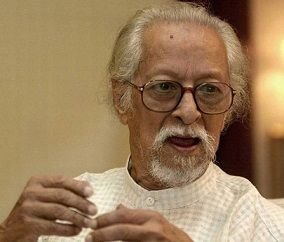Chidananda Dasgupta

Subscribe to read full article
This section is for paid subscribers only. Our subscription is only $37/- for one full year.
You get unlimited access to all paid section and features on the website with this subscription.
Not ready for a full subscription?
You can access this article for $2 , and have it saved to your account for one year.
- Born: 20 November, 1921 (Shillong)
- Died: 22 May, 2011 (Kolkata)
- Primary Cinema: Bengali
- Parents: Shantilata, Manmathanath Dasgupta
- Spouse: Supriya Das
- Children: Aparna Sen
- Grand Children: Konkana Sen Sharma
Filmmaker, film critic, film historian and pioneer of the film society movement in India, Chidananda Dasgupta directed seven films including Portrait of a City (1961), The Dance of Shiva (1968), The Stuff of Steel (1969), Bilet Pherat (1972), Zaroorat Ki Purti (1979), and Amodini (1994). He also composed the music of his feature films Bilet Pherat and Amodini; the latter starred his daughter Aparna Sen and his granddaughter Konkana Sen Sharma. His close association with legendary filmmaker Satyajit Ray led to the formation of the Calcutta Film Society in 1947. More than a decade later, the Federation of Film Societies of India was set up on his initiative. One of the early pioneers who carved a space for serious film criticism in India, he was also an extraordinary writer in both English and Bengali. He was honoured with the lifetime achievement award at Osian's Cinefan Film Festival in 2004 in recognition of his writings on films, which include books such as Talking about Films, The Cinema of Satyajit Ray, and Unpopular Cinema. Living and working in Calcutta and Santiniketan, he was recognised mostly as a film critic. However, his writing was not limited to cinema; he also wrote on literature and translated many Bengali works into English. Related to the renowned poet, Jibanananda Das, he translated several of Das’ poems.
He was born in Shillong on 20 November, 1921 to Shantilata and Brahmo missionary and social worker Manmathanath Dasgupta. Participating in politics in the 1940s during the anti-British Quit India movement, he went on to start teaching at St Columba's College, Hazaribagh. Teaching at City College, Calcutta and switching to advertising, he went on to make his name as a film critic and historian.
In 1947, along with Satyajit Ray, RP Gupta, Bansi Chandragupta, Harisadhan Dasgupta and others, Dasgupta founded the Calcutta Film Society. Under his initiative along with that of Satyajit Ray, Vijaya Mulay, Ammu Swaminathan, Robert Hawkins, Diptendu Pramanick, Abul Hassan and A Roychowdhury, the Federation of Film Societies of India was set up in 1959. The Federation went on to play a key role in the growth of the film society movement in India.
Well-known for his essays and translations of Rabindranath Tagore, Manik Bandopadhyay and Jibanananda Das, Dasgupta shared unique insights into the poetry of Das, with whom he shared a close association. Best known for his work as a film historian and film critic, he penned more than 2000 articles on cinema in various periodicals. Starting the Indian Film Quarterly in 1957 along with Satyajit Ray and others, he also made valuable contributions to the British film magazine Sight and Sound. Having closely studied the work of Satyajit Ray, who was also his personal friend, Dasgupta’s book The Cinema of Satyajit Ray is considered one of the definitive works on Ray. His publications include Seeing is Believing: Selected Writings on Cinema, Selected Poems – Jibanananda Das, The Painted Face: Studies in India's Popular Cinemas, Satyajit Ray: An anthology of statements on Ray and by Ray, Talking about Films, and Unpopular Cinema. As a film critic he is credited with developing theories of realist cinema as well as the role of the All-India Film in nationalist politics.
As a filmmaker, Dasgupta directed as many as seven films. These include Portrait of a City (1961), The Dance of Shiva (1968), The Stuff of Steel (1969), Bilet Pherat (1972), Zaroorat Ki Purti (1979), and Amodini (1994). Bilet Pherat was a reworking of the Dhiren Gangluy classic from 1921 – this time comprising of three stories written by Dasgupta. The most popular of the three stories was Rakta, which later released as a separate feature film in 1973. Amodini, which starred his daughter Aparna Sen and his granddaughter Konkana Sen Sharma along with Rachana Banerjee, Anusree Das and Pijush Ganguly, was a comedy. A satirical Indian fairy tale, it riffs on the rigid Brahminical social structures that often forced young women into unwanted marriages.
A picture of dignity and restraint, Chidananda Dasgupta is also credited with giving film criticism the importance it deserves. He was a pioneer in the movement towards serious writing on cinema. Through his writings he repeatedly stressed that the distinction between art house cinema and mainstream cinema is a myth. Honoured with the Lifetime Achievement Award for Best Writing at the Sixth Osian’s Cinefan Festival of Asian Cinema in 2004, it was for the first time that a Lifetime Achievement Award was conferred on a film critic and scholar. In his response to being thus awarded, Dasgupta pointed out that he was getting the award at a time when film criticism was almost dying out in India, and that a lifetime had been spent teaching people the value and worth of cinema. “When we first asked for government help to form the first film society, the official at the ministry said, ‘Film society, what’s that?’ Thankfully, lots of things have changed since then,” he had averred.
On the personal front, he married Supriya Das, daughter of Brahmananda Dasgupta and brother of poet Jibanananda Das, in 1944. His daughter Aparna Sen is a famous actress and filmmaker. His granddaughter Konkona Sen Sharma is also an actress and filmmaker.
Chidananda Dasgupta passed away on 22 May, 2011 in Kolkata.
References
Image credit: https://upperstall.com/profile/luminary/chidananda-dasgupta/







.jpg)



